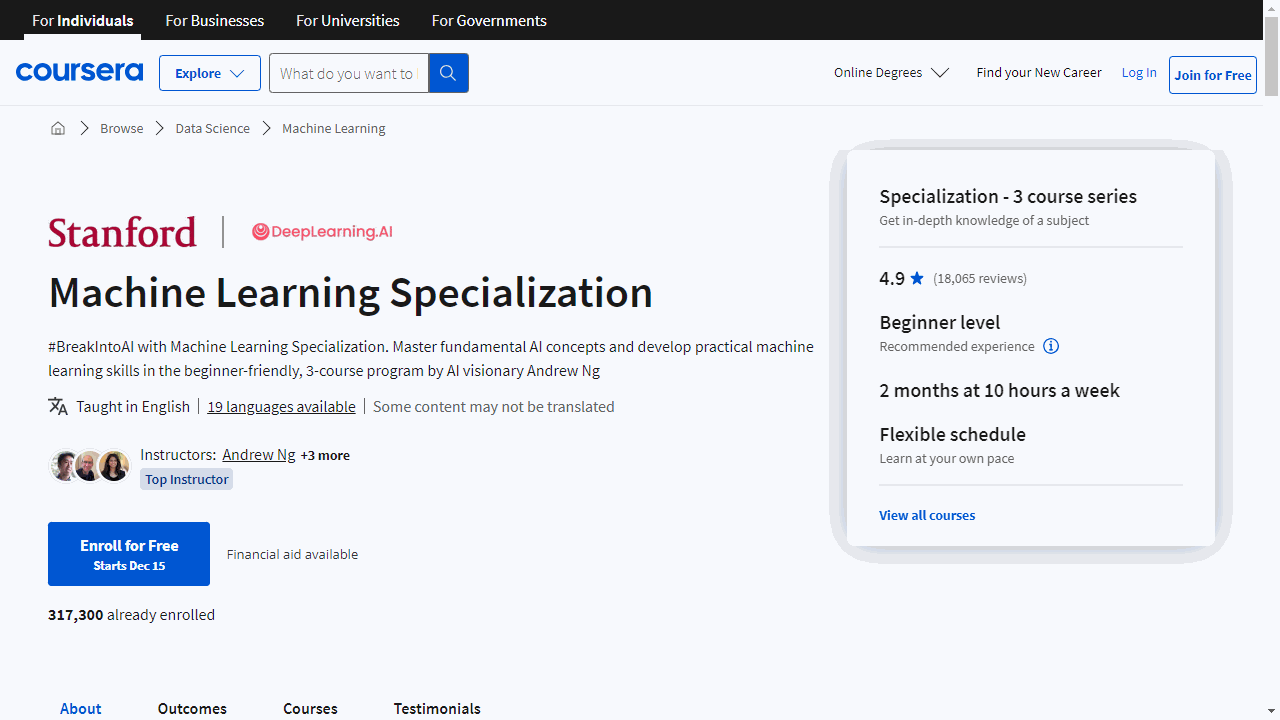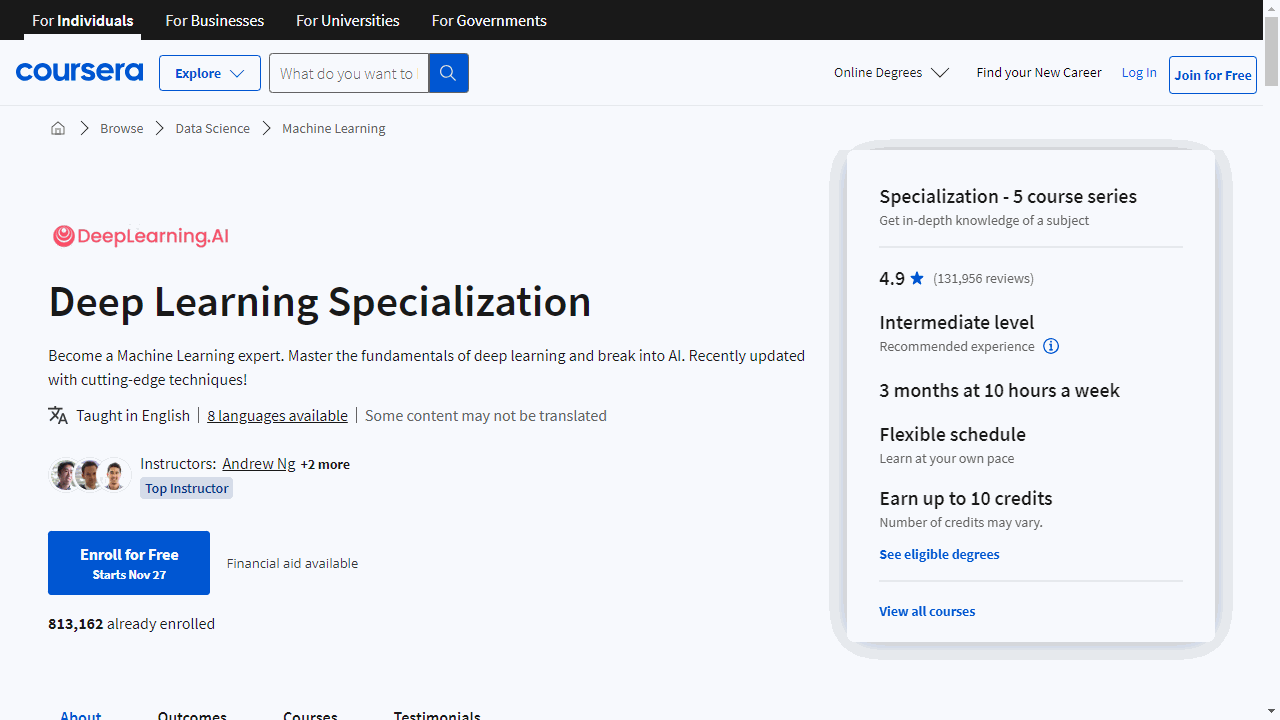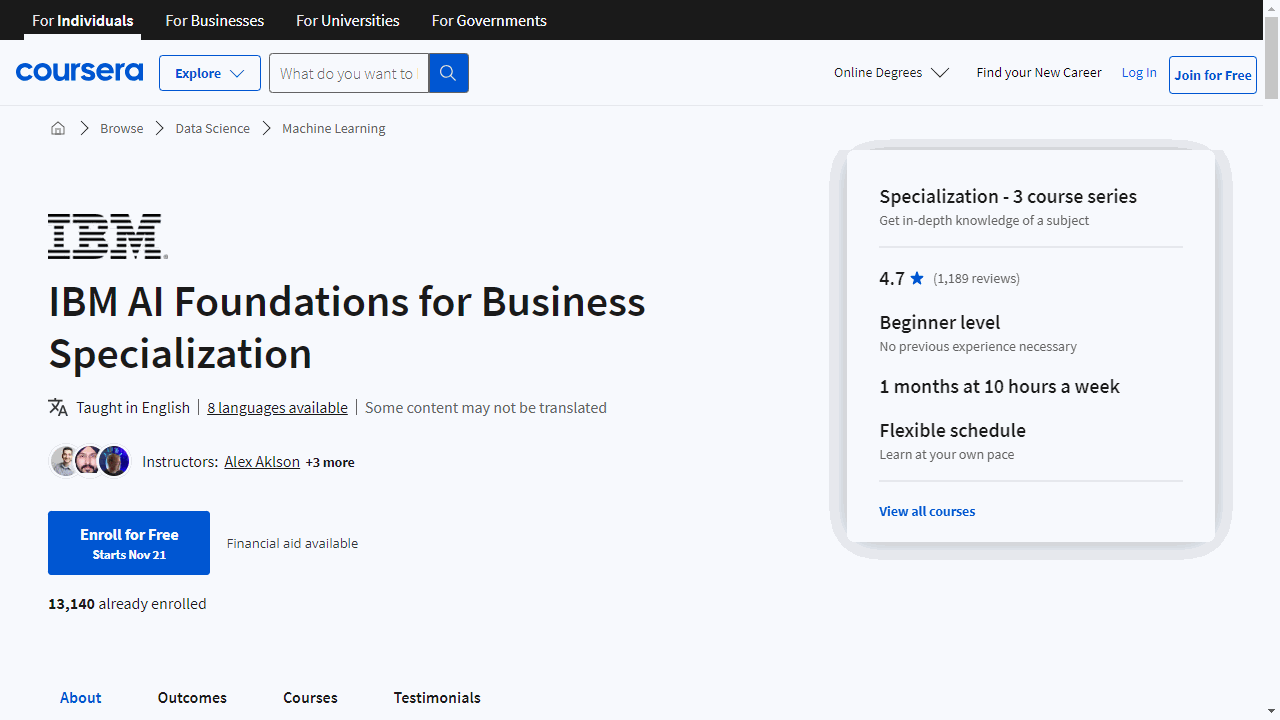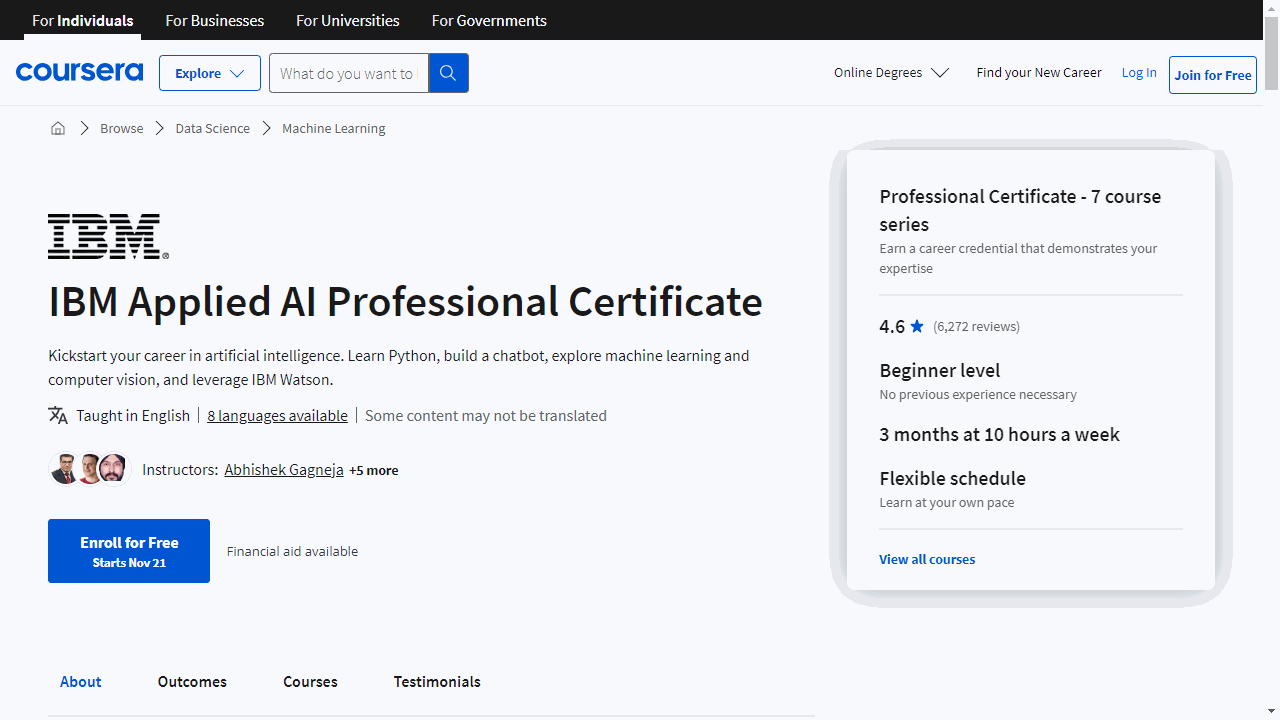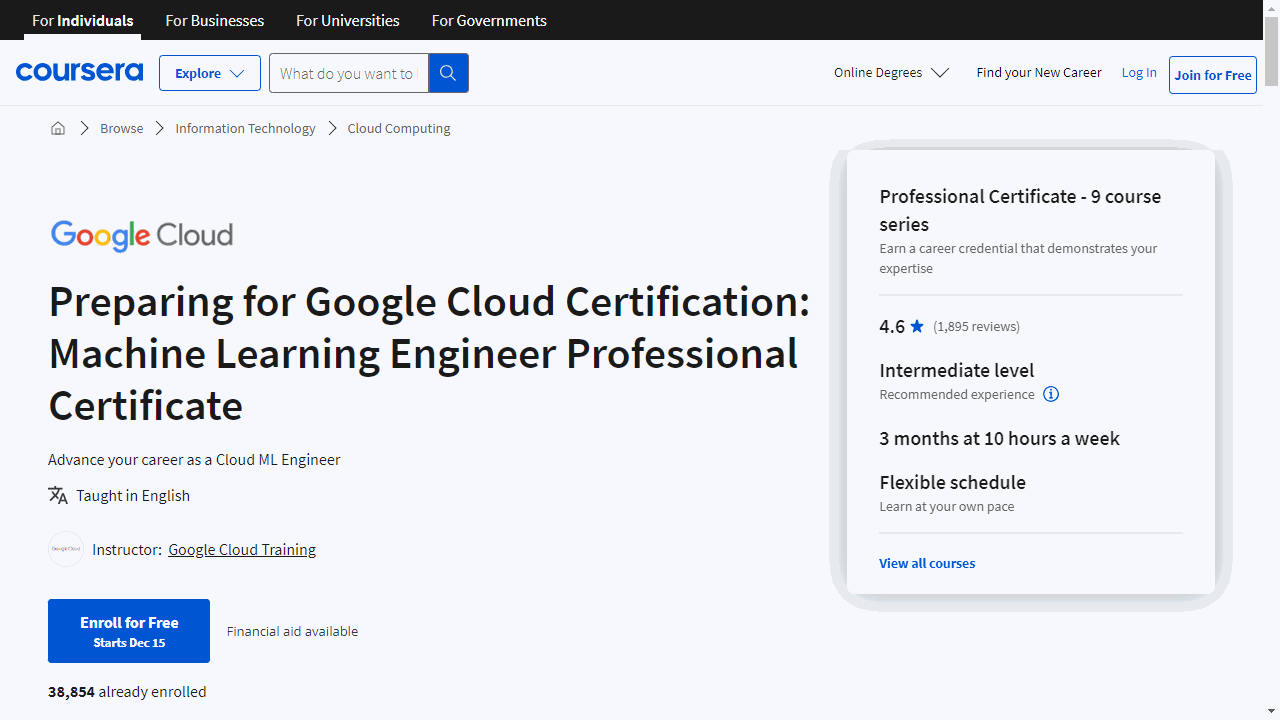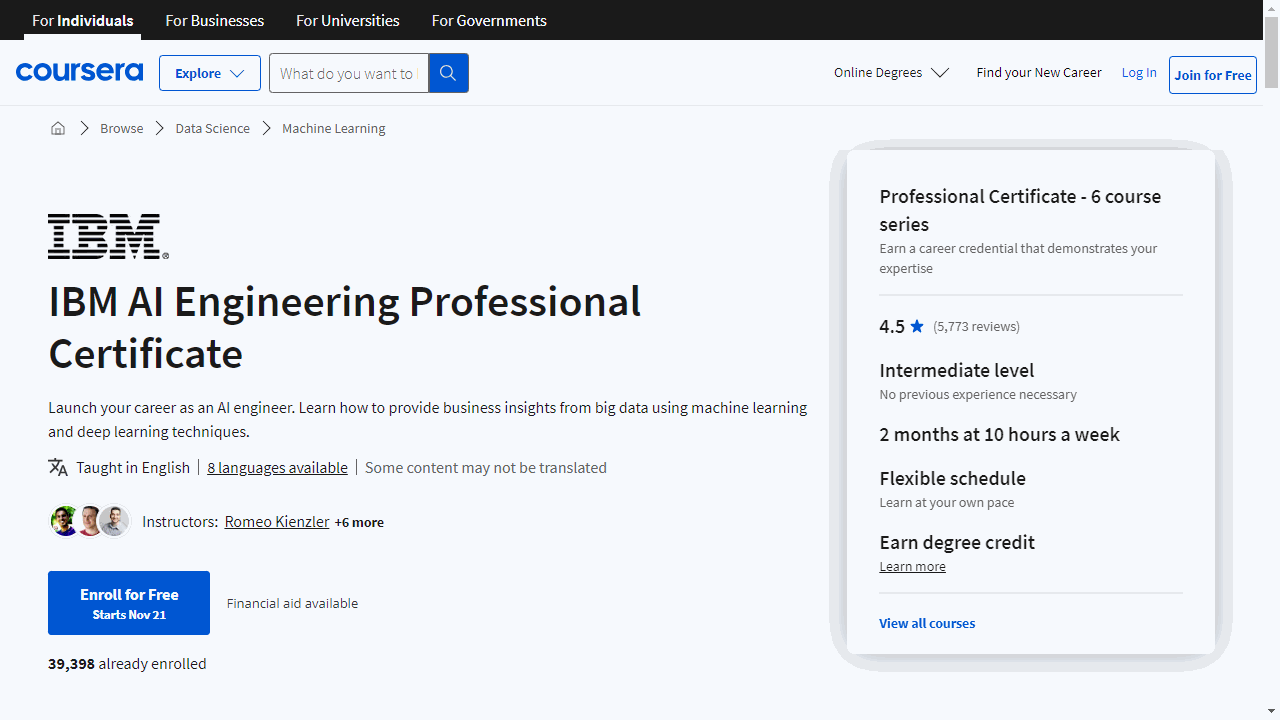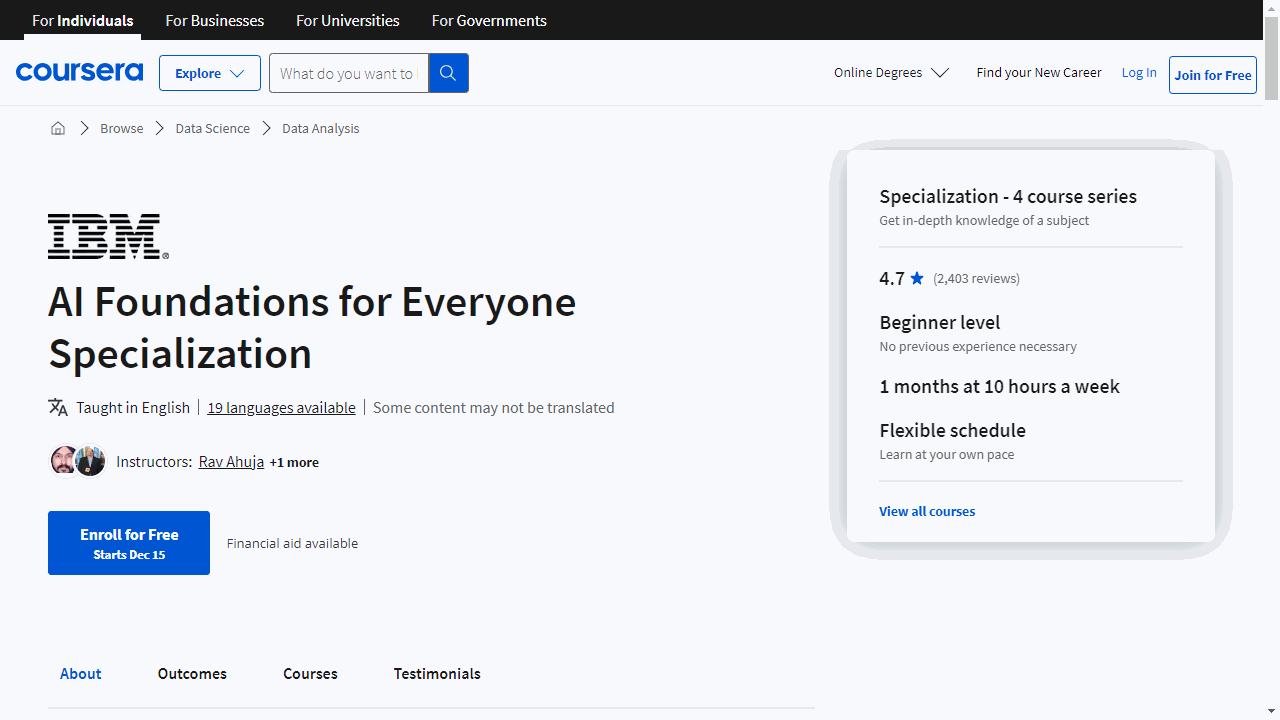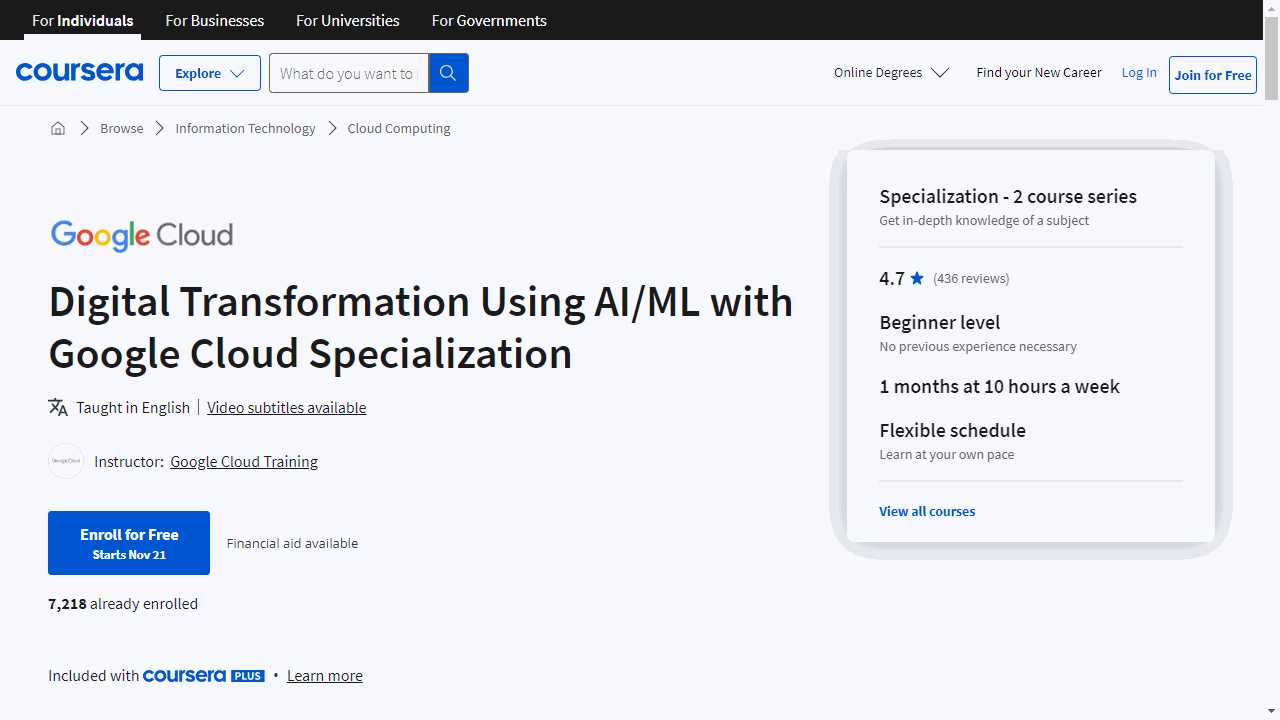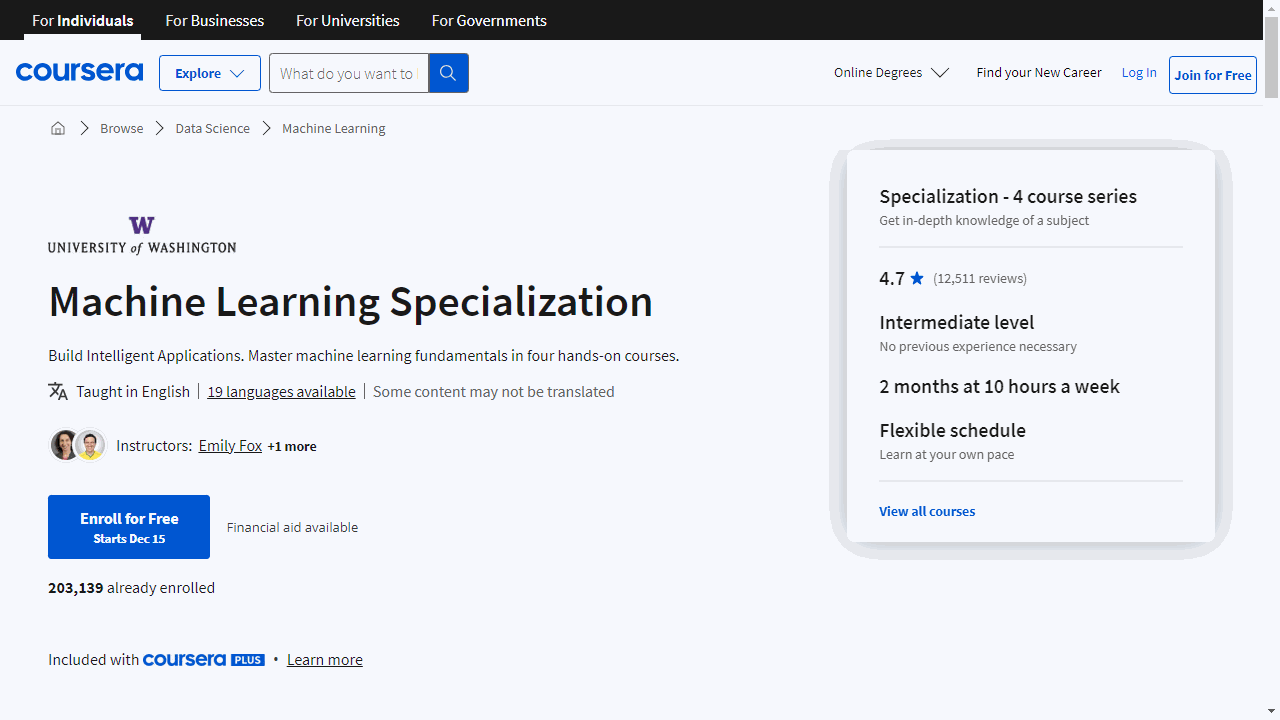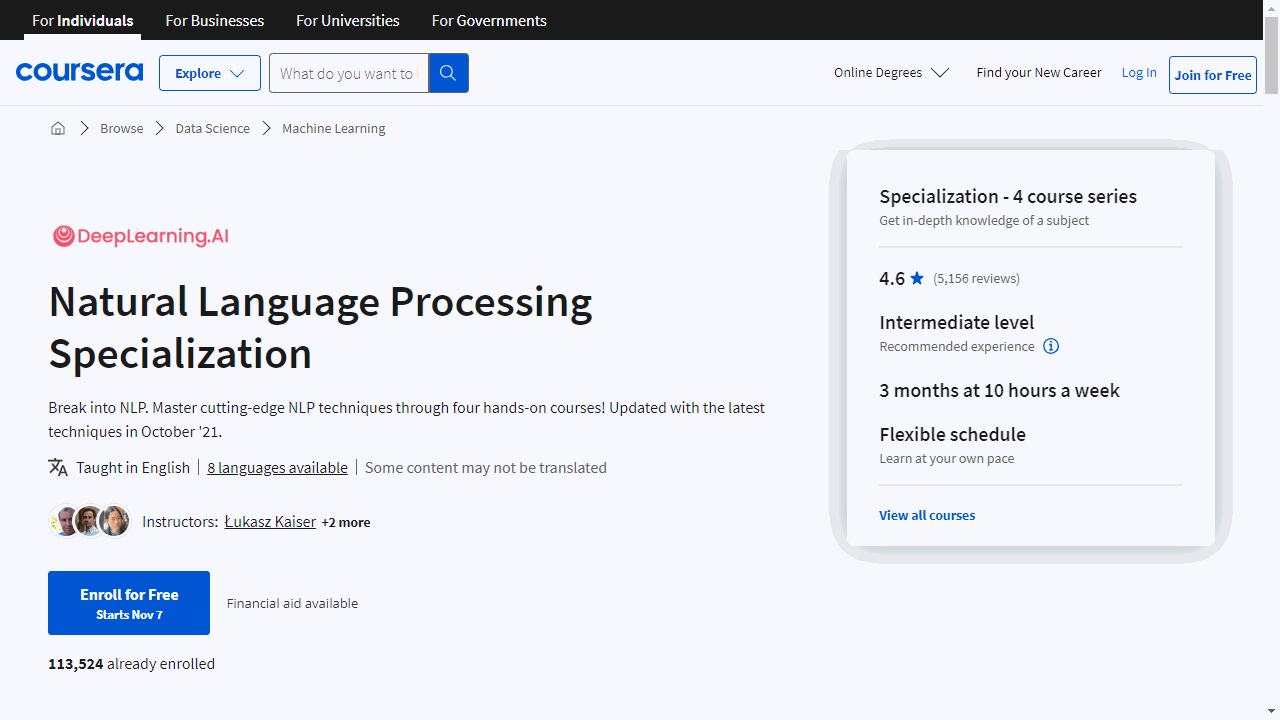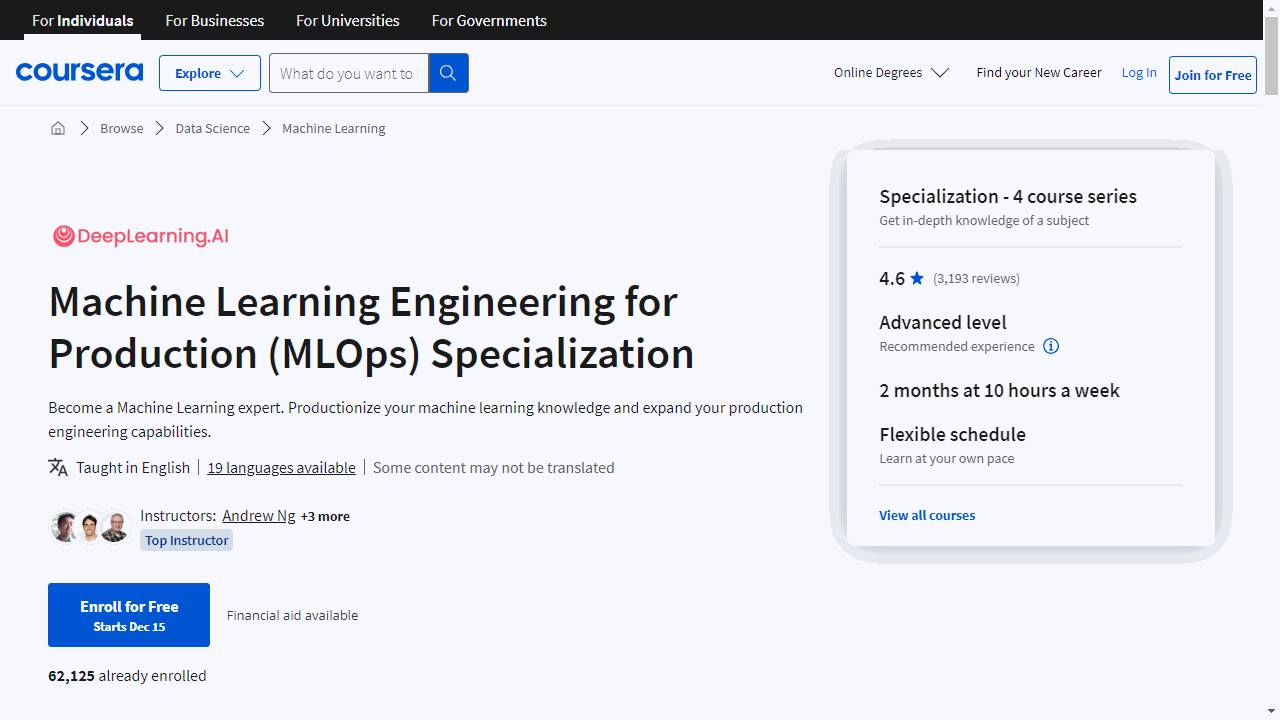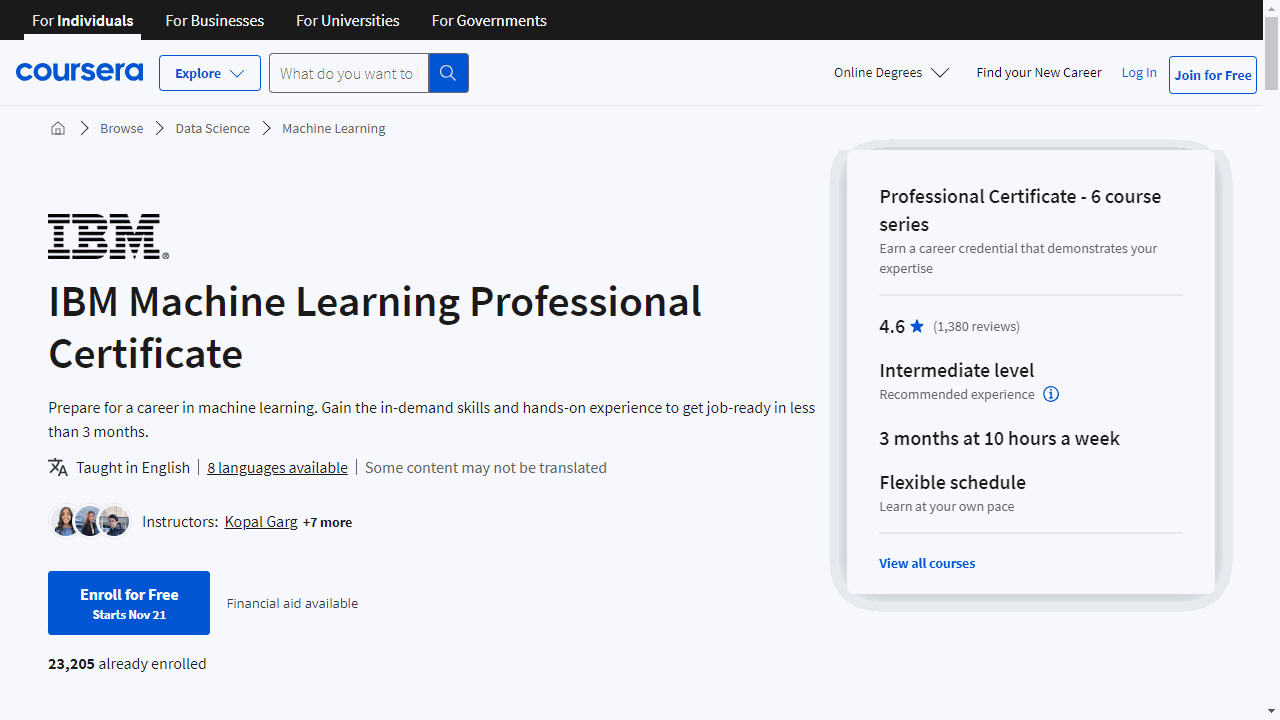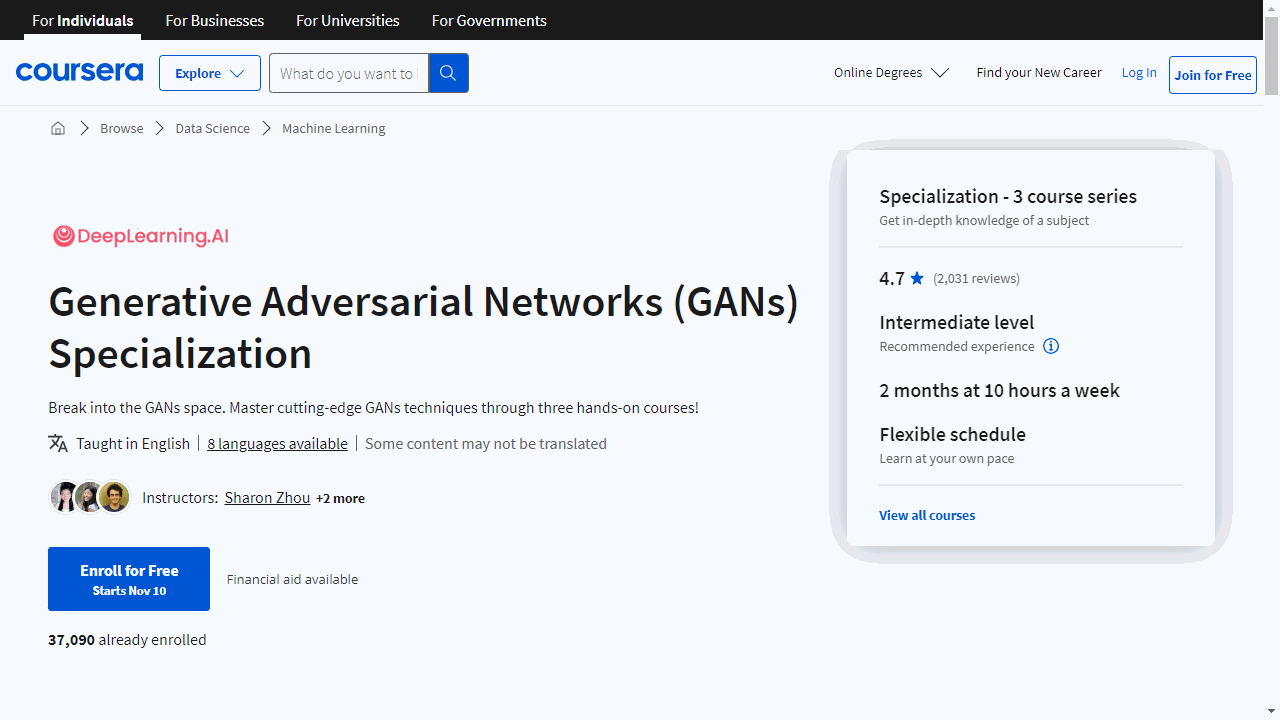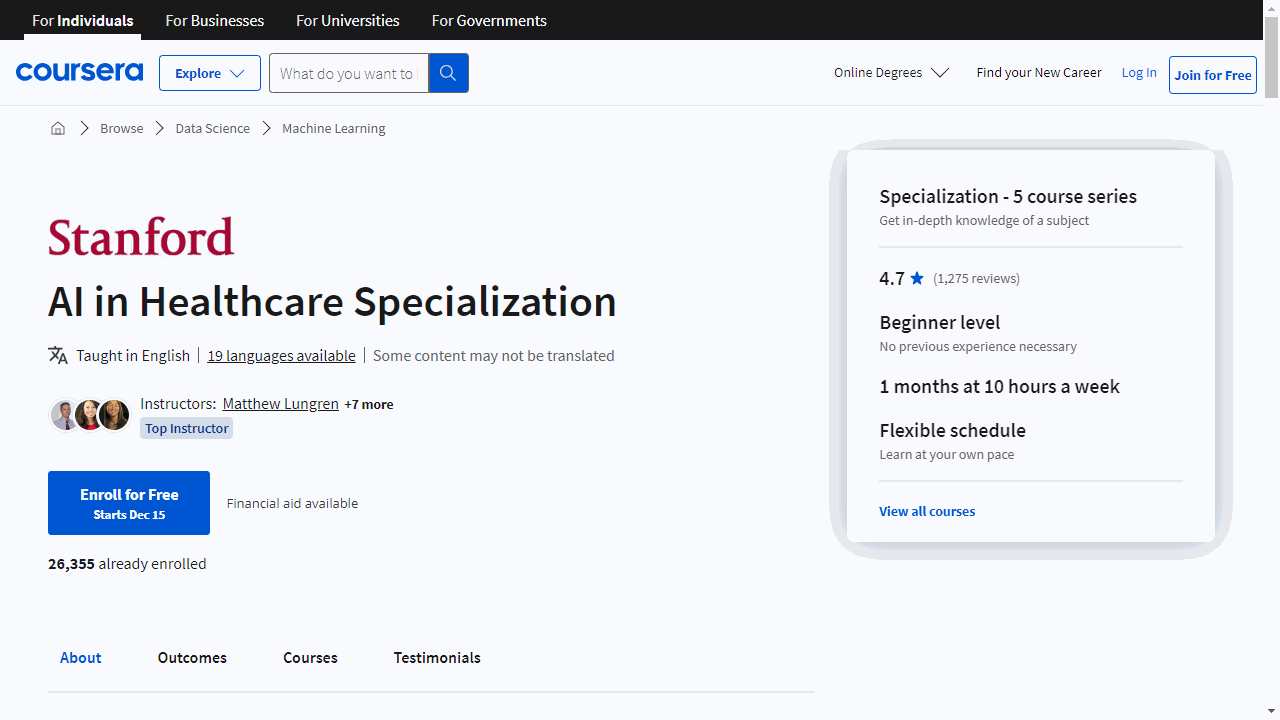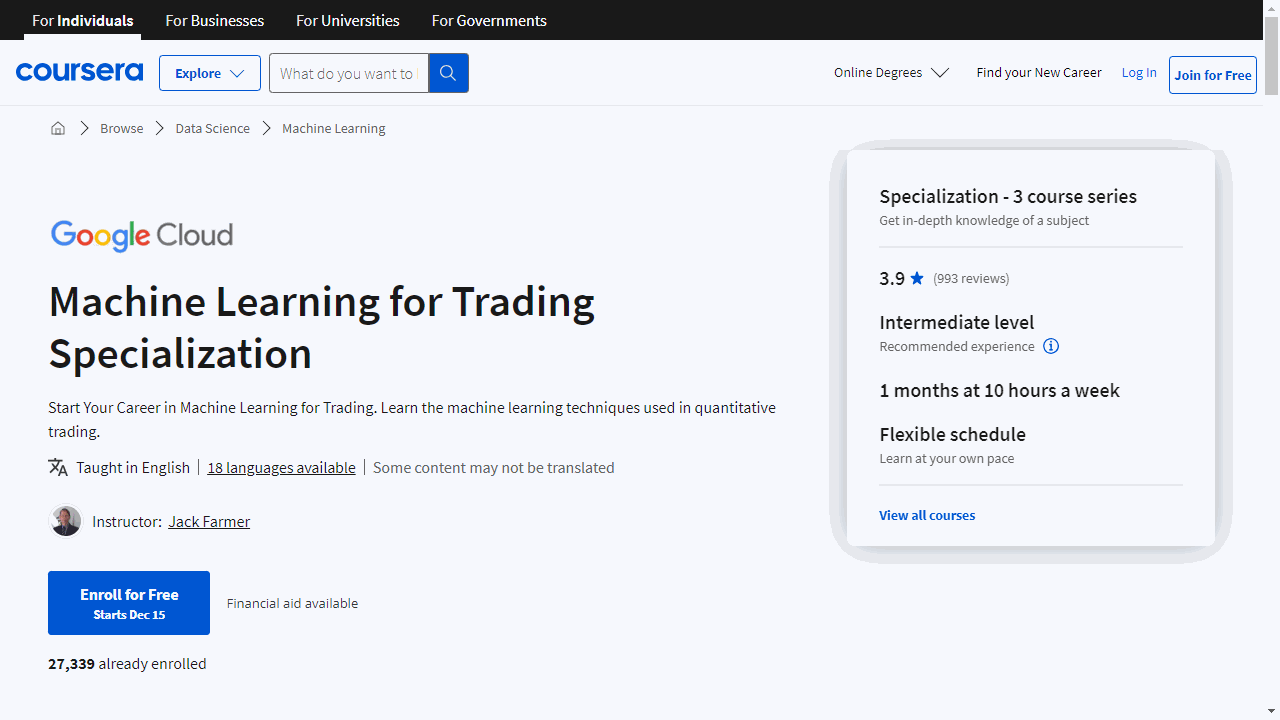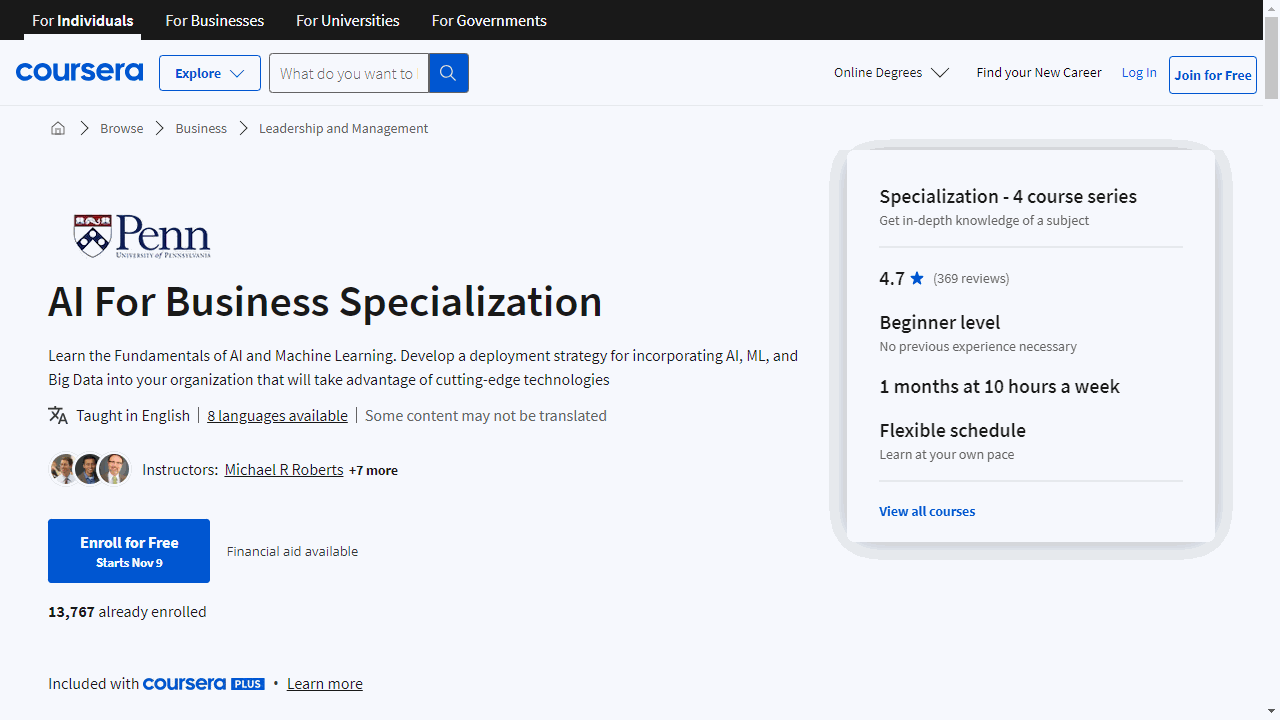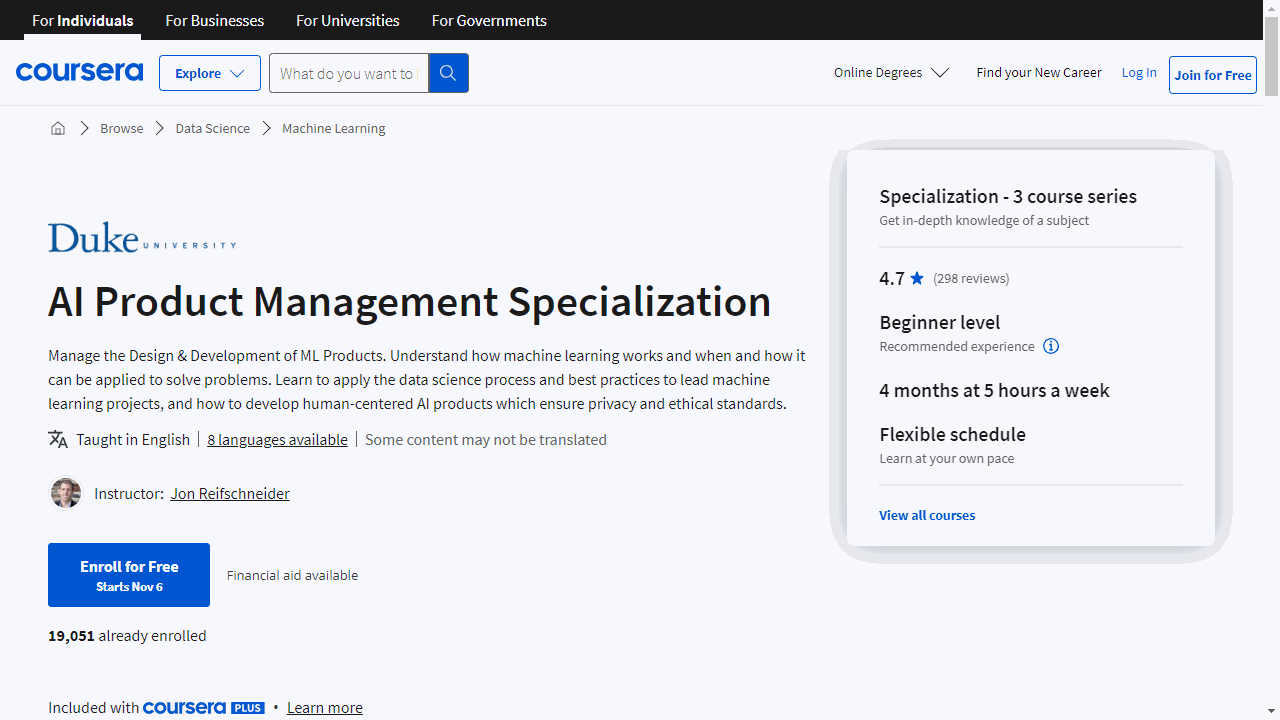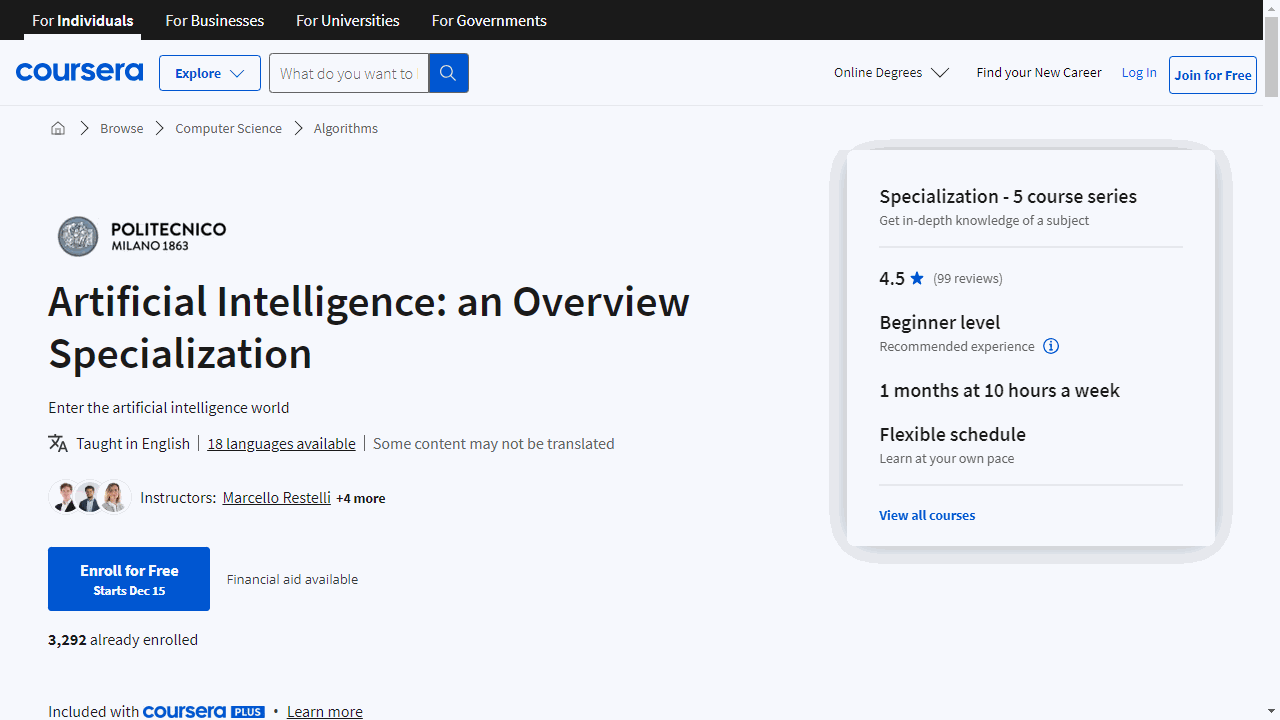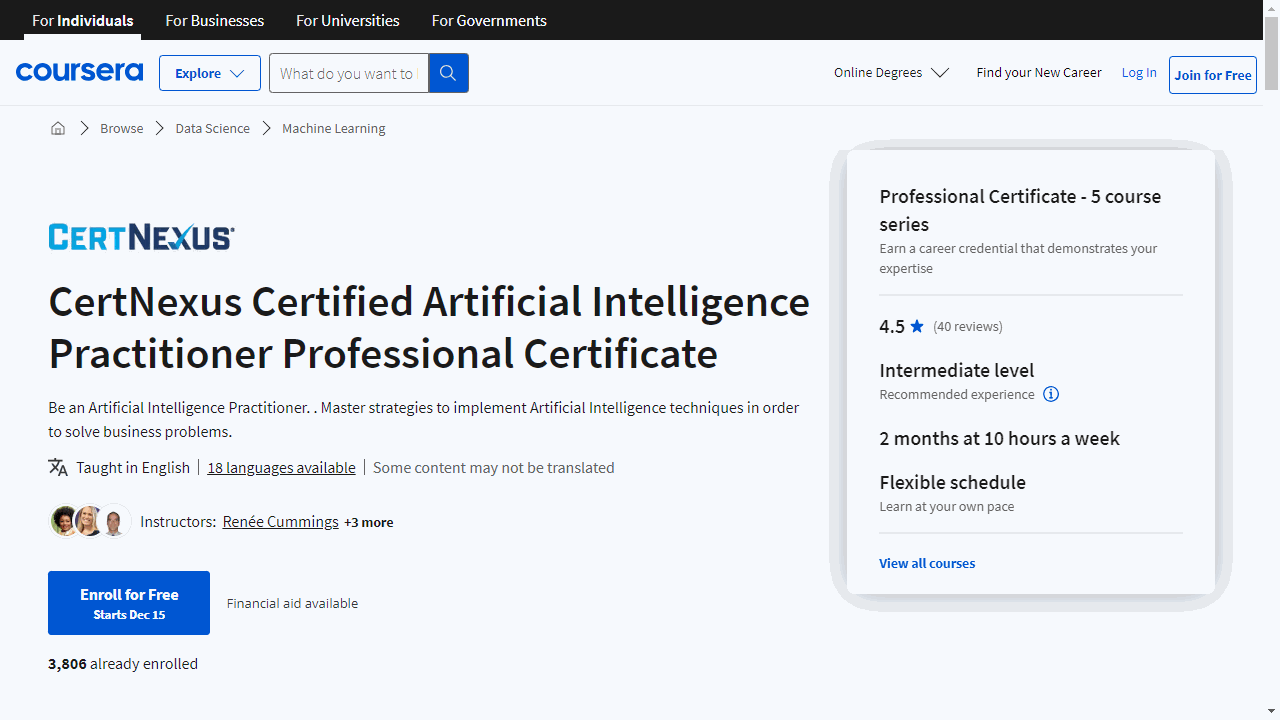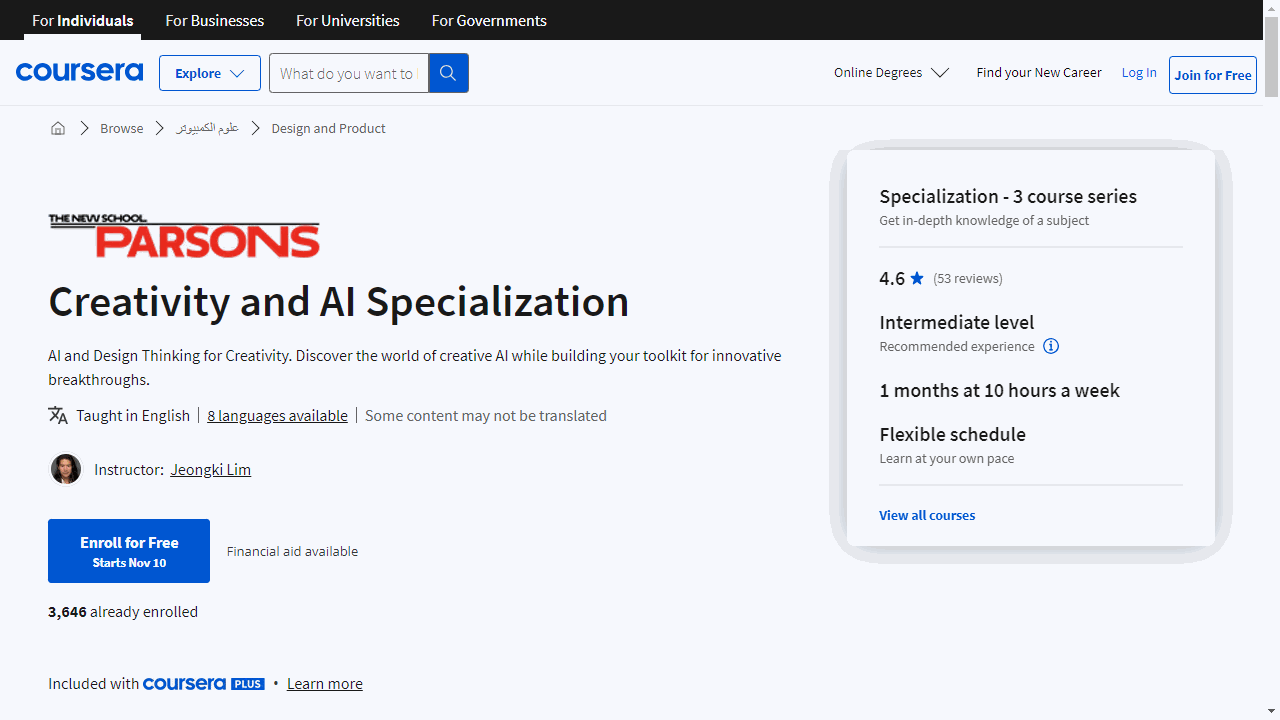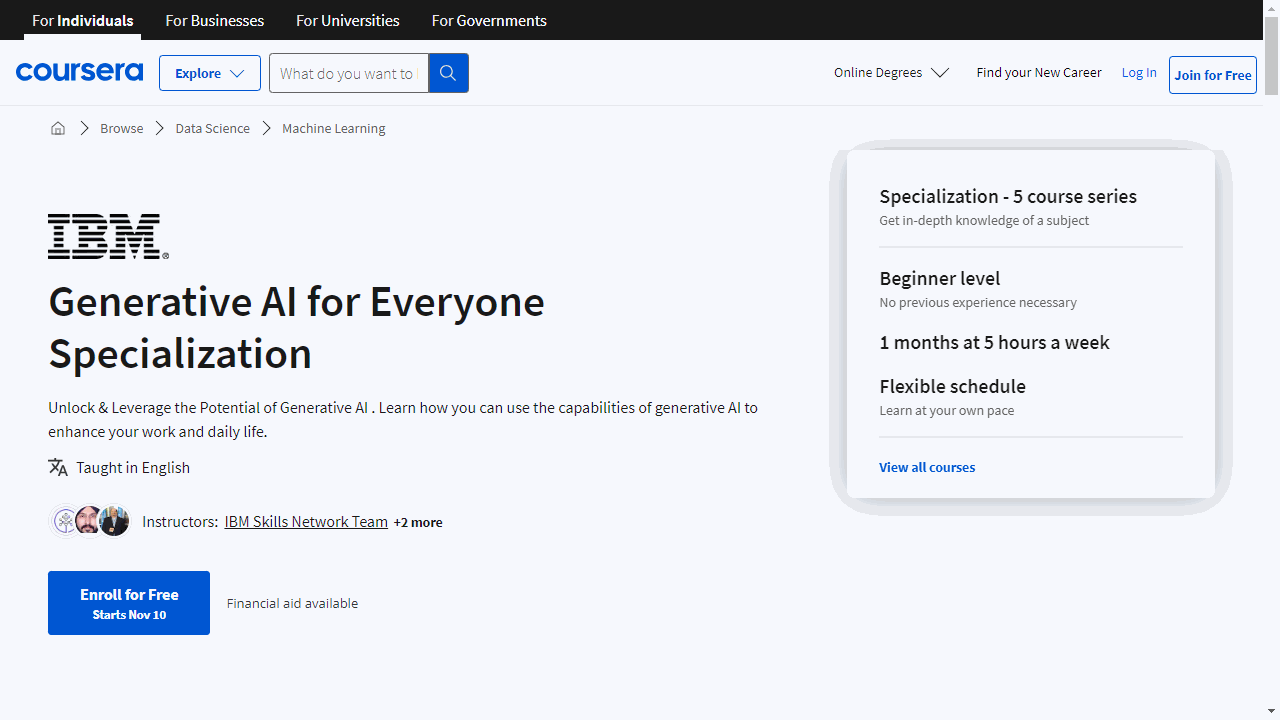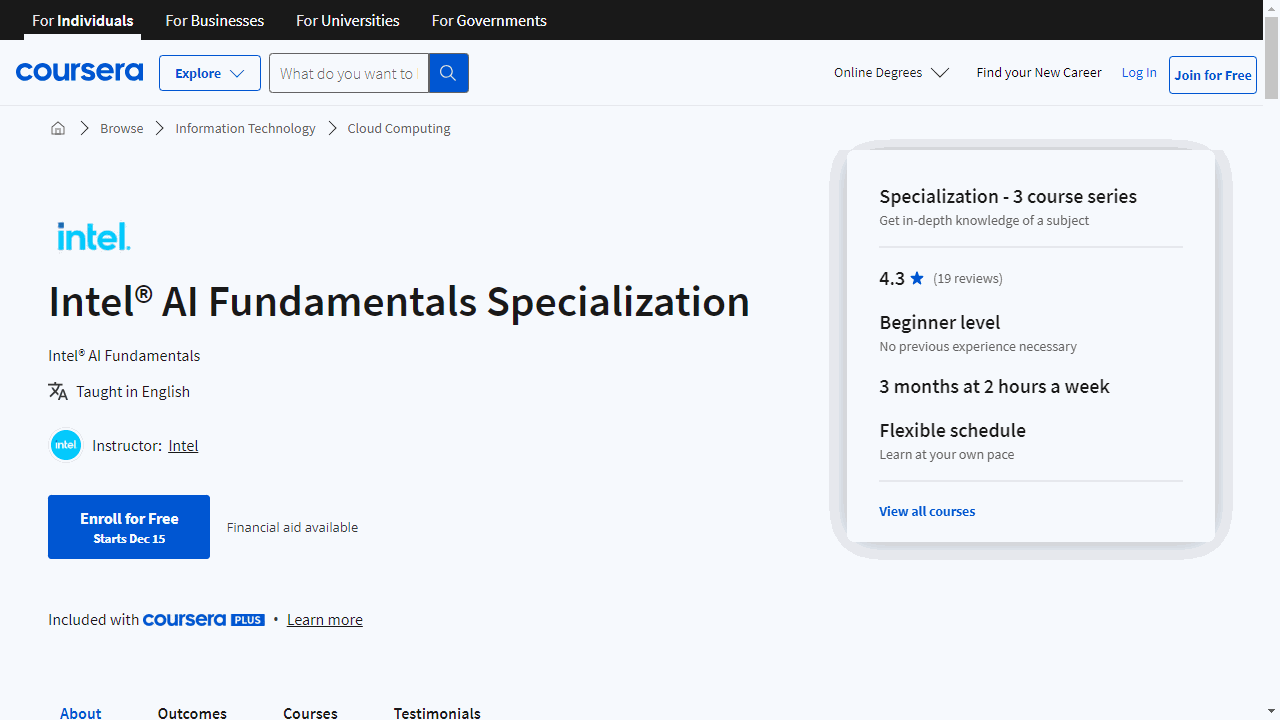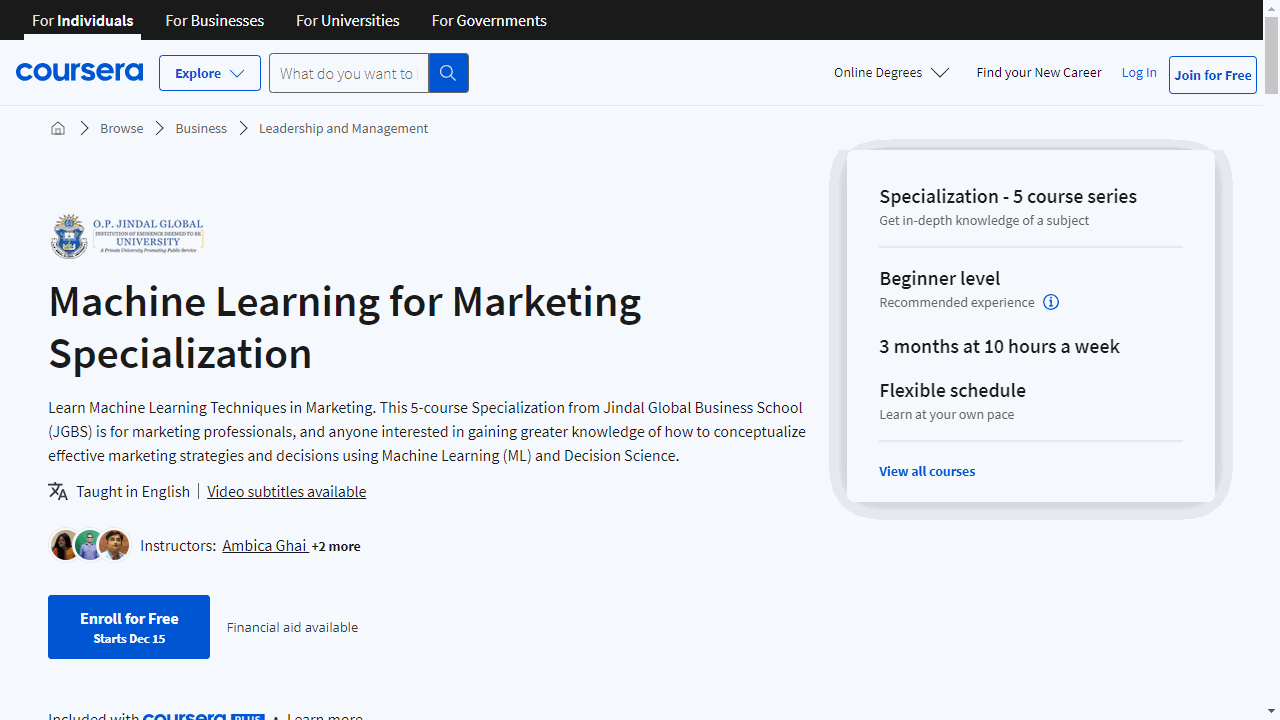Artificial intelligence (AI) is rapidly transforming our world, from automating tasks to creating groundbreaking technologies.
Learning AI can equip you with valuable skills, empowering you to contribute to this exciting field and unlock a range of career opportunities in diverse industries.
Whether you’re a curious beginner or a seasoned professional seeking to expand your skillset, AI knowledge can make you a valuable asset in today’s technology-driven world.
Finding the right AI course on Coursera can be a challenging task, given the vast array of options available.
You might be looking for a program that is comprehensive, engaging, and taught by experts, while also aligning with your learning style and career goals.
For the best overall AI course on Coursera, we recommend the Stanford Machine Learning Specialization.
This program is led by renowned AI expert Andrew Ng and offers a comprehensive exploration of machine learning, covering both fundamental concepts and advanced techniques.
You’ll gain hands-on experience using Python, NumPy, and scikit-learn, and master essential algorithms like linear regression, logistic regression, and neural networks.
While the Stanford Machine Learning Specialization stands out as our top choice, there are many other great AI courses available on Coursera.
Keep reading to discover our curated list of the best AI courses for beginners, intermediate learners, and experts, covering diverse topics like deep learning, natural language processing, and computer vision.
Stanford Machine Learning Specialization
Provider: Stanford University, DeepLearning.AI
Taught by AI expert Andrew Ng, this specialization is an updated version of his renowned Machine Learning course.
You’ll benefit from his clear teaching style and deep industry insights.
Starting with “Supervised Machine Learning: Regression and Classification,” you’ll learn to create predictive models using Python, NumPy, and scikit-learn.
You’ll master linear regression for forecasting and logistic regression for tasks like email filtering or disease diagnosis.
In the “Advanced Learning Algorithms” course, you’ll dive deeper.
You’ll build neural networks with TensorFlow, a skill crucial for developing sophisticated AI applications.
You’ll also get to grips with decision trees, random forests, and boosted trees, enhancing your models’ accuracy and reliability.
The final course, “Unsupervised Learning, Recommenders, Reinforcement Learning,” introduces you to AI’s creative side.
You’ll explore clustering, anomaly detection, and build recommender systems using collaborative filtering and content-based methods.
Plus, you’ll tackle deep reinforcement learning, teaching AI to improve through experience.
By completing this specialization, you’ll gain a comprehensive understanding of machine learning, from linear regression to neural networks and beyond.
Deep Learning Specialization
Provider: DeepLearning.AI
Starting with “Neural Networks and Deep Learning,” you’ll delve into the core concepts that power AI breakthroughs.
This course lays the foundation, teaching you to construct and train deep neural networks using TensorFlow, setting the stage for advanced learning.
Progressing to “Improving Deep Neural Networks: Hyperparameter Tuning, Regularization and Optimization,” you’ll unlock the secrets behind enhancing neural network performance.
This course is a deep dive into the intricacies of TensorFlow, focusing on practical techniques like hyperparameter tuning and optimization algorithms that are crucial for fine-tuning your models.
In “Structuring Machine Learning Projects,” you’ll shift gears to strategic thinking, learning to lead machine learning projects with confidence.
This course offers insights into project management in the AI space, teaching you to navigate complex machine learning settings and make decisions that can propel your projects to success.
“Convolutional Neural Networks” introduces you to the transformative world of computer vision.
You’ll explore how to apply these networks to tasks such as image recognition and style transfer, gaining hands-on experience with TensorFlow to process visual data.
Finally, “Sequence Models” rounds out the specialization by immersing you in the applications of sequence data.
From speech recognition to NLP, you’ll learn to build models that handle sequential information, using TensorFlow to tackle challenges like machine translation and chatbot creation.
IBM AI Foundations for Business Specialization
Provider: IBM
The specialization kicks off with “Introduction to Artificial Intelligence (AI),” a course that demystifies AI for learners of all backgrounds.
You’ll delve into the essence of AI, its transformative role in various industries, and the foundational concepts such as machine learning and neural networks.
The course also addresses the societal impacts of AI, including ethical considerations and the future job landscape.
The highlight? A mini project that allows you to apply what you’ve learned in a practical setting.
Moving on to “What is Data Science?” you’ll discover the reasons behind data science’s growing reputation.
This course breaks down the role of data scientists and the significance of their work in extracting meaningful insights from data.
It’s an exploration of the analytical skills that power predictions and strategic decisions in business.
Insights from seasoned professionals provide a window into the real world of data science, offering guidance for aspiring data scientists.
Finally, “The AI Ladder: A Framework for Deploying AI in your Enterprise” is designed for those looking to integrate AI into their business strategy.
This course introduces the AI Ladder, a strategic framework for implementing AI solutions effectively.
It’s an essential guide for anyone involved in the decision-making process of AI adoption, providing clarity on the necessary steps for successful integration.
Each course within this specialization is crafted to provide actionable knowledge and insights, preparing you to navigate and leverage AI and data science in practical scenarios.
IBM Applied AI Professional Certificate
Provider: IBM
Embarking on the IBM Applied AI Professional Certificate through Coursera is a strategic move if you are curious about the burgeoning field of Artificial Intelligence.
This suite of courses is meticulously designed to cater to learners from all walks of life, regardless of their technical expertise.
The journey begins with “Introduction to Artificial Intelligence (AI),” a course that demystifies AI for the uninitiated.
It’s an accessible entry point that doesn’t demand a background in programming or computer science.
You’ll come to understand AI’s transformative impact on society, grasp foundational concepts like machine learning, and consider the ethical implications of this powerful technology.
For those intrigued by the creative potential of AI, “Generative AI: Introduction and Applications” offers a deep dive into the world of content creation through AI.
You’ll explore the capabilities of groundbreaking models and tools, such as GPT and DALL-E, and understand their practical applications across various domains.
The course includes hands-on labs, allowing you to experiment with IBM’s Generative AI Classroom and familiarize yourself with generative models.
Delving further into the nuances of AI, “Generative AI: Prompt Engineering Basics” teaches you the art of prompt engineering.
This skill is crucial for steering generative AI models to produce targeted outcomes.
Through this course, you’ll learn to craft effective prompts and utilize IBM’s prompt engineering tools, enhancing the precision and relevance of AI-generated content.
If coding isn’t your forte, “Building AI Powered Chatbots Without Programming” is an ideal pick.
This course empowers you to create engaging chatbots using IBM Watson’s Natural Language Processing capabilities, all without writing a single line of code.
You’ll learn to deploy these chatbots on a website, ensuring they provide value and enhance user experience.
If you are ready to tackle programming, “Python for Data Science, AI & Development” is a comprehensive introduction to one of the most sought-after programming languages in the industry.
You’ll start from the basics and quickly progress to using Python for data manipulation and web scraping, building a solid foundation for further exploration in data science and AI.
Putting your Python skills to practical use, “Developing AI Applications with Python and Flask” guides you through creating AI-enabled web applications.
This project-based course reinforces your understanding of Python and introduces Flask, a micro web framework, as you develop and deploy an AI application.
Lastly, “Building AI Applications with Watson APIs” rounds out the certificate by teaching you to integrate multiple Watson AI services.
You’ll gain insights into best practices for creating sophisticated AI applications that can interact with users through text and voice, preparing you to build systems that can be deployed across various platforms.
Each course in the IBM Applied AI Professional Certificate is a stepping stone towards fluency in AI.
You’ll gain practical skills, work on projects that bolster your portfolio, and learn from one of the leading names in technology.
This certificate is more than just a learning experience—it’s an investment in your future in the AI landscape.
Preparing for Google Cloud Certification: Machine Learning Engineer Professional Certificate
Provider: Google Cloud
Created by Google Cloud, this program equips you with the skills to excel in machine learning and prepare for the Google Cloud Machine Learning Engineer certification exam.
Dive into “Google Cloud Big Data and Machine Learning Fundamentals” to understand the journey from data to AI.
You’ll learn to craft data pipelines and create machine learning models using Vertex AI and AutoML, giving you a practical start.
In “How Google does Machine Learning,” you’ll discover Google’s approach to ML, including best practices and responsible AI.
This course emphasizes the importance of ethical AI solutions.
“Launching into Machine Learning” focuses on data quality and analysis, teaching you to build and train models with BigQuery ML.
You’ll also master model optimization, ensuring your AI performs well.
“TensorFlow on Google Cloud” is where you’ll get technical, creating models with TensorFlow and Keras and learning to scale them with Vertex AI.
This course is essential for applying your models effectively.
With “Feature Engineering,” you’ll enhance your models by selecting impactful data features using tools like BigQuery ML and TensorFlow.
You’ll also get familiar with preprocessing and exploring features for better predictions.
“Machine Learning in the Enterprise” applies your skills to real-world business scenarios, exploring data management and when to use different modeling approaches.
It’s about making AI work in a corporate setting.
“Production Machine Learning Systems” prepares you to deploy robust ML systems.
You’ll tackle model dependencies and distributed training, ensuring your systems are ready for any challenge.
“MLOps: Getting Started” introduces you to deploying, monitoring, and operating ML systems.
You’ll adopt continuous improvement practices to keep your AI at its best.
Finally, “ML Pipelines on Google Cloud” deepens your expertise in ML pipelines with TensorFlow Extended (TFX) and MLflow.
You’ll learn to automate and manage the ML lifecycle, making your workflow efficient and scalable.
This professional certificate is a comprehensive path to becoming a skilled Machine Learning Engineer.
You’ll gain hands-on experience with Google Cloud tools, TensorFlow, and Keras, and understand the full machine learning workflow from data management to model deployment.
IBM AI Engineering Professional Certificate
Provider: IBM
Embarking on a journey through the IBM AI Engineering Professional Certificate on Coursera can be a transformative step in your career, whether you’re just starting out or looking to deepen your expertise in AI and Machine Learning.
The course “Machine Learning with Python” is an excellent starting point.
It eases you into the complex world of Machine Learning, covering essential concepts and algorithms.
You’ll gain practical experience with Python’s powerful libraries, such as SciPy and scikit-learn, and by the end of the course, you’ll be adept at building and evaluating diverse Machine Learning models.
Moving on, “Introduction to Deep Learning & Neural Networks with Keras” demystifies deep learning.
It’s a course that clarifies the nuances between traditional neural networks and their deep learning counterparts.
Through hands-on exercises, you’ll learn to construct deep learning models using Keras, gaining insights into both supervised and unsupervised deep learning models.
For those intrigued by how AI can interpret images, “Introduction to Computer Vision and Image Processing” offers a practical introduction.
You’ll explore the applications of computer vision and learn to manipulate images using Python, Pillow, and OpenCV.
The course culminates in a project where you’ll build a computer vision web app, providing a real-world application of your skills.
“Deep Neural Networks with PyTorch” delves into the PyTorch library, a favorite among researchers for its flexibility and ease of use.
Starting with the basics, the course guides you through the creation of advanced models, including the implementation of various activation functions, normalization, and dropout layers.
By the end, you’ll be proficient in building deep neural networks with PyTorch.
In “Building Deep Learning Models with TensorFlow,” you’ll explore TensorFlow’s capabilities in handling unstructured data.
The course covers a range of deep architectures and teaches you how TensorFlow can be applied to solve complex problems through deep learning, providing a solid foundation for further exploration and innovation.
The “AI Capstone Project with Deep Learning” is where you’ll apply everything you’ve learned to a real-world problem.
This project-based course allows you to select a library and develop a deep learning model, offering a chance to demonstrate your ability to handle a complete deep learning pipeline from data preprocessing to model validation.
AI Foundations for Everyone Specialization
Provider: IBM
Dive into “Introduction to Artificial Intelligence (AI)” to uncover the essentials of AI, including its transformative role in society.
You’ll demystify terms like machine learning and neural networks, and address the ethical implications of AI.
This course is designed for all backgrounds, so you don’t need to be a tech expert to get started.
“Generative AI: Introduction and Applications” introduces you to the creative side of AI.
Discover how generative models like GPT and DALL-E are revolutionizing industries by producing original text, images, and more.
Through hands-on labs, you’ll experiment with these models, including ChatGPT, and understand their real-world applications.
If you’re intrigued by how to effectively communicate with AI, “Generative AI: Prompt Engineering Basics” is your go-to.
Learn to craft prompts that direct AI tools to generate precise outcomes.
You’ll explore techniques and tools for prompt engineering, enhancing your ability to interact with AI like a pro.
Finally, “Building AI Powered Chatbots Without Programming” empowers you to create chatbots using IBM Watson’s Natural Language Processing capabilities.
You’ll learn to design, test, and deploy chatbots that enhance user experience—all without writing a single line of code.
Plus, you’ll have the opportunity to deploy your chatbot on a provided website.
Each course is packed with practical knowledge and skills, from understanding AI basics to deploying sophisticated chatbots.
You’ll gain insights from IBM experts and access to cutting-edge tools, preparing you for a future in AI.
Digital Transformation Using AI/ML with Google Cloud Specialization
Provider: Google Cloud
Let’s break down what these courses offer and why they might be the right fit for you.
Take “Infrastructure and Application Modernization with Google Cloud,” for instance.
It’s designed for those who find themselves at a crossroads with outdated IT systems.
This course provides a practical roadmap for leveraging cloud technology to revitalize your infrastructure.
You’ll gain insights into the pivotal role of cloud modernization in digital transformation and understand the various options for running compute workloads in the cloud.
The course demystifies concepts like containers, serverless computing, and APIs, showing you how they can be used to modernize applications effectively.
It also addresses strategic decisions, such as when to opt for hybrid or multi-cloud strategies, and introduces tools like GKE Enterprise to support these choices.
Moving on to “Managing Machine Learning Projects with Google Cloud,” this course is tailored for business professionals who may not have a technical background but are eager to oversee machine learning initiatives.
It strips away the technical jargon, focusing instead on how to translate business challenges into machine learning solutions.
You’ll learn to identify viable machine learning use cases, assess their potential impact, and understand the steps involved in bringing an ML project to fruition.
The course also covers essential considerations such as data quality and bias, equipping you with the knowledge to manage ML projects with an informed perspective.
These courses stand out for their practical approach, guiding you through the complexities of digital transformation with clarity and focus.
They’re not just about learning new concepts; they’re about applying them to drive real change in your organization.
By choosing these courses, you’re not just learning; you’re preparing to lead your business through the evolving landscape of digital technology with the confidence and support of Google Cloud’s robust infrastructure.
Machine Learning Specialization
Provider: University of Washington
This is a comprehensive program that equips you with the skills to harness the power of machine learning in practical scenarios.
In “Machine Learning Foundations: A Case Study Approach,” you’ll start by treating machine learning as a black box, focusing on real-world applications.
You’ll learn to predict house prices, analyze sentiments from reviews, and even recommend products.
This course emphasizes understanding the tasks at hand and applying machine learning methods like regression and classification to a variety of domains, all while using Python.
Moving on to “Machine Learning: Regression,” you’ll delve into models that predict continuous values, such as housing prices.
You’ll master regularized linear regression, tackle feature selection, and implement optimization algorithms that can manage large datasets.
By the end, you’ll confidently build and tune regression models to make accurate predictions.
With “Machine Learning: Classification,” you’ll classify data into categories, such as predicting loan defaults or analyzing sentiments in reviews.
This course introduces you to logistic regression, decision trees, and boosting, teaching you to create classifiers that perform well on various tasks.
You’ll also learn to handle missing data and evaluate model performance using precision-recall metrics.
Lastly, “Machine Learning: Clustering & Retrieval” will show you how to find similar documents in a sea of data.
You’ll explore k-nearest neighbors, understand different similarity metrics, and use clustering techniques like k-means.
Advanced topics like latent Dirichlet allocation (LDA) and expectation maximization (EM) are also covered, giving you a robust understanding of document clustering.
Throughout this specialization, you’ll gain practical experience with Python programming and machine learning concepts, preparing you to build intelligent applications.
Natural Language Processing Specialization By DeepLearning.AI
Provider: DeepLearning.AI
This series is a goldmine for anyone eager to master the art of teaching computers to understand human language. Let’s dive into what makes each course stand out and why they’re worth your time.
Start your journey with “Natural Language Processing with Classification and Vector Spaces.”
Here, you’ll unlock the secrets of sentiment analysis, learning to gauge the emotions behind tweets with logistic regression and naïve Bayes.
You’ll also explore the connections between words using vector space models and even dip your toes into machine translation, crafting a simple English to French translator.
This course sets the stage for you to create applications that can analyze text and answer questions with precision.
Then, there’s “Natural Language Processing with Probabilistic Models.”
Ever been saved by auto-correct when texting? You’ll get to build one yourself, understanding the magic behind those helpful suggestions.
You’ll also tackle part-of-speech tagging with the Viterbi Algorithm, a cornerstone of computational linguistics. And for a cherry on top, you’ll construct a Word2Vec model, teaching a neural network to understand word meanings through embeddings.
As you progress to “Natural Language Processing with Sequence Models,” things get even more exciting.
Now you will train neural networks to perform sentiment analysis on tweets, and generate text.
You’ll also learn named entity recognition to extract key information from sentences. Plus, you’ll experiment with ‘Siamese’ network models to identify questions with the same intent but different wording.
Cap off your learning with “Natural Language Processing with Attention Models.”
Here, you’ll translate full sentences into German and summarize blocks of text using cutting-edge attention models. You’ll also get hands-on with T5 and BERT, the powerhouses of NLP, for question-answering tasks. And if you’ve ever dreamed of creating a chatbot, this course will show you how, using a Reformer model.
The brains behind this Specialization are Younes Bensouda Mourri from Stanford, Łukasz Kaiser from Google Brain.
With a bit of machine learning and Python knowledge in your toolkit, you’re all set to embark on an NLP adventure that could transform your career in data science.
Machine Learning Engineering for Production (MLOps) Specialization
Provider: DeepLearning.AI
This hands-on program equips you with the skills to build, manage, and deploy AI applications effectively.
Start with “Introduction to Machine Learning in Production,” where you’ll learn to navigate the ML lifecycle, scope projects, and set model baselines.
You’ll tackle concept drift and design ML systems from the ground up, preparing you to handle real-world deployment challenges.
Move on to “Machine Learning Data Lifecycle in Production,” where building robust data pipelines is key.
You’ll master data cleaning, validation, and feature engineering with TensorFlow Extended.
This course ensures you understand how to maintain high data quality throughout your AI system’s lifecycle.
In “Machine Learning Modeling Pipelines in Production,” you’ll create models for various serving environments and manage resources for efficient inference.
Dive into model fairness and explainability, ensuring your AI solutions are responsible and understandable.
Finally, “Deploying Machine Learning Models in Production” teaches you to launch models for user interaction.
You’ll construct scalable infrastructures, automate workflows, and monitor systems to ensure reliability and compliance with standards like GDPR.
By completing this specialization, you’ll gain expertise in MLOps, TensorFlow, data transformation, and model monitoring.
IBM Machine Learning Professional Certificate
Provider: IBM
This comprehensive suite of courses is meticulously crafted to ensure you gain practical, hands-on experience that aligns with the machine learning industry demands.
The journey begins with “Exploratory Data Analysis for Machine Learning,” where you’ll learn to extract and refine data from diverse sources.
This foundational course emphasizes the significance of quality data and equips you with techniques for feature engineering and data preparation, setting the stage for robust analysis.
As you progress to “Supervised Machine Learning: Regression,” you’ll delve into predictive modeling, focusing on regression to anticipate continuous outcomes.
This course sharpens your ability to evaluate model performance and introduces regularization to combat overfitting, a crucial skill in building reliable predictive models.
For scenarios where outcomes are categorical, “Supervised Machine Learning: Classification” offers the tools to train and assess models adept at classification.
You’ll explore logistic regression and decision trees, gaining proficiency in managing unbalanced datasets—a common challenge in real-world applications.
“Unsupervised Machine Learning” shifts the focus to discovering patterns in unlabeled data.
Here, you’ll tackle clustering and dimensionality reduction, learning to discern structure in complex datasets.
This course is ideal for those looking to uncover hidden insights without predefined targets.
The “Deep Learning and Reinforcement Learning” course introduces you to advanced topics that are shaping the future of AI.
You’ll get to grips with neural networks and explore the potential of reinforcement learning, an area brimming with research and innovation.
Culminating the certificate is the “Machine Learning Capstone,” where you apply your accumulated knowledge to build a sophisticated recommender system.
This final project not only consolidates your learning but also serves as a showcase of your capabilities, ready to impress potential employers.
With a focus on practical application, you’ll emerge from this certificate not just with theoretical knowledge but with the confidence to tackle real-world machine learning challenges.
Generative Adversarial Networks (GANs) Specialization
Provider: DeepLearning.AI
This series of courses is structured to guide you from the elementary principles to the more complex aspects of GANs in a coherent and understandable way.
Even though today diffusion models, like DALL-E, Midjourney, and Stable Diffusion, dominate the field of image generation, GANs are still used to improve the quality of the generated images.
Starting with “Build Basic Generative Adversarial Networks (GANs),” you’ll delve into the world of GANs, uncovering their potential to revolutionize image generation.
The course simplifies complex concepts, allowing you to grasp the mechanics behind GANs and to experiment with various architectures.
You’ll also tackle the creation of conditional GANs, which can generate images within specific categories.
Beyond the technical skills, the course addresses critical issues such as machine learning bias and privacy concerns.
Practical exercises with PyTorch will enable you to train and refine your own models, ensuring that you’re not just learning theory but also applying it.
Moving on to “Build Better Generative Adversarial Networks (GANs),” you’ll deepen your understanding by learning how to evaluate the performance of your GANs using methods like the Fréchet Inception Distance.
The course introduces you to StyleGANs, a sophisticated model known for generating highly realistic images.
Here, the focus is on refining your GANs for better output while continuing to consider the ethical implications of your work.
The final course, “Apply Generative Adversarial Networks (GANs),” shows you how GANs can solve practical problems.
You’ll explore applications beyond image generation, such as data augmentation and enhancing privacy.
Projects like Pix2Pix and CycleGAN will give you a taste of how GANs can transform images in innovative ways, such as altering satellite imagery or changing the appearance of animals in photographs.
Throughout the specialization, you’ll acquire a range of skills, from controllable generation to understanding convolutional neural networks.
AI in Healthcare Specialization
Provider: Stanford University
By focusing on practical skills and ethical considerations, this specialization prepares you to be a part of AI’s transformative impact on healthcare.
Start with “Introduction to Healthcare,” where you’ll get a clear picture of the U.S. healthcare system’s inner workings.
Understanding the roles of physicians, hospitals, and insurance is crucial, and you’ll tackle the big issues like managing costs and improving care quality.
Move on to “Introduction to Clinical Data,” which equips you with the tools to ethically mine medical data.
You’ll learn to craft datasets and analyze them to answer clinical questions, all while considering the ethical implications of your work.
In “Fundamentals of Machine Learning for Healthcare,” you’ll demystify machine learning, even if you’re new to the field.
This course breaks down complex concepts like neural networks and model training into digestible parts, empowering you to evaluate and deploy AI in medicine confidently.
Then, “Evaluations of AI Applications in Healthcare” guides you through integrating AI into clinical settings.
You’ll explore how to assess AI’s impact on healthcare delivery, ensuring that the technology is used fairly and effectively.
The “AI in Healthcare Capstone” is where theory meets practice.
You’ll dive into a real-world scenario, using a unique dataset to build models that inform patient care decisions.
This hands-on project also addresses the regulatory and ethical considerations of using AI in healthcare.
Throughout these courses, you’ll gain continuing education credits, a bonus for healthcare professionals looking to stay ahead.
Machine Learning for Trading Specialization
Provider: New York Institute of Finance, Google Cloud
This set of courses is a practical deep dive into applying machine learning to the world of finance and trading.
Kick off with “Introduction to Trading, Machine Learning & GCP” to master trading basics like trends and volatility.
You’ll also learn to craft quantitative trading strategies and use machine learning to predict market movements.
The course leverages Google Cloud Platform and Jupyter Notebooks, giving you hands-on experience in building financial models.
You should come prepared with advanced Python knowledge and a solid foundation in statistics and financial markets.
Familiarity with machine learning libraries such as Scikit-Learn is also crucial.
The second course, “Using Machine Learning in Trading and Finance,” steps up the game.
It’s all about developing sophisticated trading strategies with machine learning.
You’ll get to grips with pairs trading and momentum trading, and use Keras and TensorFlow to create and test your own models.
The final course, “Reinforcement Learning for Trading Strategies,” introduces you to the cutting-edge world of reinforcement learning.
Discover how to integrate neural networks with reinforcement learning, apply LSTMs to time series data, and develop trading strategies that learn and adapt.
Each course builds on the last, ensuring you develop a robust understanding of both machine learning and trading.
By the end, you’ll be equipped to build, test, and optimize trading strategies using the latest AI techniques.
AI For Business Specialization
Provider: Wharton School of the University of Pennsylvania
This series of courses is designed to demystify AI for professionals who aren’t steeped in data science, providing practical insights and tools that can be applied directly to your business.
The specialization kicks off with “AI Fundamentals for Non-Data Scientists.”
This course is a comprehensive introduction to machine learning and big data, tailored for those without a technical background.
You’ll learn to create algorithms using accessible tools like Teachable Machine and TensorFlow, understand the nuances of deep learning, and how to refine your models for better accuracy.
Insights from industry leaders at companies like McDonald’s and Visa bring real-world context to the lessons, ensuring you can apply what you learn to actual business scenarios.
Moving on to “AI Applications in Marketing and Finance,” you’ll discover how AI can enhance customer experiences and extend their engagement with your brand.
The course covers the analysis of consumer behavior, targeting marketing efforts effectively, and improving fraud detection.
It’s a deep dive into the practical applications of AI that can help safeguard customer data and optimize financial operations.
For those interested in the human side of business, “AI Applications in People Management” explores the intersection of AI and HR.
This course covers the entire employee lifecycle, from recruitment to retention, and how machine learning can be leveraged to make informed HR decisions.
You’ll also learn about the importance of data ethics and how to mitigate bias, ensuring your AI solutions are fair and equitable.
Lastly, “AI Strategy and Governance” provides a strategic framework for implementing AI in your business.
You’ll explore how AI can be used to gain a competitive edge, the importance of explainable AI, and how to establish responsible governance practices.
The course also touches on managing organizational change as AI becomes more integrated into business processes.
By the end of the specialization, you’ll have a solid foundation in AI, ready to harness its potential to drive your business forward.
AI Product Management Specialization By Duke University
Provider: Duke University
These 3 courses will give you a rock-solid foundation in AI and machine learning concepts.
You’ll learn how ML models work under the hood, when to apply them, and how to manage ML projects from start to finish.
In the first course, you’ll get a beginner-friendly intro to core ML algorithms and techniques.
No coding required! The focus is on building intuition about how models like neural networks actually learn from data.
The second course walks you through the full life cycle of an ML product - from identifying opportunities to model building, testing, and deployment.
You’ll gain best practices for organizing data science projects.
The Specialization rounds out with a deep dive into the human side of AI.
You’ll learn strategies for designing ethical, transparent ML systems that customers can trust.
Privacy, bias, and augmenting human intelligence are all covered.
By the end, you’ll have the skills to shepherd ML products from conception to delivery.
You’ll know what it takes to build AI that solves real problems for users.
Artificial Intelligence: an Overview Specialization
Provider: Politecnico di Milano
This comprehensive program gives you a clear understanding of AI’s evolution, ethical considerations, legal frameworks, technological underpinnings, and machine learning essentials.
Start with “Artificial Intelligence: An Overview” to grasp AI’s foundational concepts and historical milestones.
You’ll explore AI’s current objectives and the significance of national strategies, gaining insight into the field’s structure and key contributors.
If ethical questions intrigue you, “Ethics of Artificial Intelligence” will equip you with the tools to assess AI’s societal impact.
Learn to navigate the ethical landscape of AI, applying critical thinking to real-world scenarios and policy-making.
Legal implications are at the forefront in “Artificial Intelligence and legal issues,” where you’ll unravel the complexities of AI in the legal domain.
Understand liability, intellectual property, and fundamental rights, ensuring you’re prepared to address AI’s legal challenges.
Tech enthusiasts will appreciate “Technologies and platforms for Artificial Intelligence,” which delves into the hardware and software powering AI innovations.
Discover the roles of Cloud, IoT, and Edge Computing, and identify the opportunities they present for AI development.
Finally, “Machine Learning: an overview” demystifies machine learning.
You’ll categorize problems, understand different learning approaches, and tackle sequential decision-making with reinforcement learning.
This specialization is a gateway to mastering AI, offering practical knowledge directly applicable to the tech industry.
Whether you’re interested in the ethical debates, legal considerations, or the nuts and bolts of AI technology, these courses provide a focused and engaging learning experience.
CertNexus Certified Artificial Intelligence Practitioner Professional Certificate
Provider: CertNexus
Starting with “Solve Business Problems with AI and Machine Learning,” you’ll grasp how AI and ML can be leveraged to address business needs.
You’ll learn to pinpoint AI applications, develop ML strategies, select the right tools, and uphold ethical standards in AI deployment.
Moving on to “Follow a Machine Learning Workflow,” this course deepens your understanding of the ML process, from data preparation to model deployment.
It emphasizes the importance of a structured approach to ensure consistent and effective outcomes.
In “Build Regression, Classification, and Clustering Models,” you’ll dive into the core algorithms that power ML.
This course equips you with the skills to train, evaluate, and fine-tune models for regression, classification, and clustering tasks, providing valuable insights for business decisions.
“Build Decision Trees, SVMs, and Artificial Neural Networks” expands your algorithmic knowledge.
You’ll learn to create and assess decision trees, SVMs, and ANNs, gaining proficiency in selecting the optimal algorithm for various data challenges.
Finally, “Preparing for Your CertNexus Certification Exam” prepares you for certification success.
It guides you through the exam process, from scheduling to showcasing your certified skills.
Throughout these courses, you’ll engage with key concepts like linear regression, decision trees, SVMs, ANNs, CNNs, and RNNs, ensuring a rich learning experience in AI and ML.
Creativity and AI Specialization
Provider: Parsons School of Design, The New School
This trio of courses from Parsons School of Design, The New School offers a deep dive into the mix between artificial intelligence and human creativity.
The course “Artificial Creativity” stands out by offering a comprehensive look at AI’s role in creative industries.
You’ll delve into the history and current theories that shape this field, learning to apply design thinking in ways that are relevant to today’s business landscape.
The course encourages you to step beyond theory, engaging in practical design research that can be tailored to your interests.
This isn’t just about learning in isolation; you’ll join discussions that broaden your perspective on creativity’s role in technology.
“Natural Creativity” shifts the focus to the human element, examining how our understanding of creativity is being transformed by AI research.
This course equips you with a nuanced view of your creative instincts and how to nurture them.
You’ll also learn to conduct design research that provides insights into creativity within your own community, a skill that’s invaluable for any professional looking to innovate.
In “Creative Artifacts,” the application of AI in the arts takes center stage.
You’ll see firsthand how artists are using machine learning to push the boundaries of creativity.
The course goes beyond the individual, considering how these tools can foster creativity within organizations and even influence economic policy.
By managing a design research project, you’ll translate these concepts into actionable strategies for business innovation.
This is a great specialization if you are looking for something that goes beyond using AI as a tool and instead explores how AI can be used to enhance creativity.
Generative AI for Everyone Specialization
Provider: IBM
The journey begins with “Generative AI: Introduction and Applications,” a course that is designed not just for tech experts but for anyone with an interest in AI.
You’ll delve into the evolution of generative AI, understand its impact across various domains, and get hands-on experience with leading AI models.
After finishing, you’ll be able to articulate the nuances of generative AI and its practical applications in the real world.
Moving on to “Generative AI: Prompt Engineering Basics,” this course demystifies the process of guiding AI to produce specific outcomes.
It’s about precision – learning to craft prompts that lead to high-quality results.
You’ll explore different techniques and gain insights into the best practices for prompt engineering.
The course equips you with the skills to effectively communicate with AI models to get the results you want.
In “Generative AI: Foundation Models and Platforms,” you’ll dive deeper into the core models that power generative AI.
This course provides a clear understanding of the technologies that underpin AI applications.
You’ll also get acquainted with various AI platforms, enhancing your ability to leverage these tools for innovative solutions.
Ethical considerations are paramount in AI, and “Generative AI: Ethical Issues, Considerations & Implications” addresses this head-on.
You’ll engage with the ethical dilemmas AI presents, from data privacy to bias.
This course encourages a thoughtful approach to AI development, ensuring you’re prepared to address and mitigate potential risks.
Lastly, “Generative AI: Future and Professional Growth” offers a forward-looking perspective.
It’s about envisioning the trajectory of generative AI and identifying how it can bolster your career.
You’ll explore emerging job roles and learn how to apply AI to enhance workplace efficiency.
Intel® AI Fundamentals Specialization
Provider: Intel
This is a practical, Intel-backed series of courses that ensures you get a solid understanding of AI together with insights into how Intel’s technology can be leveraged for business success.
Starting with “AI Essentials,” you’ll get a clear introduction to the fundamentals.
This course equips you with knowledge about AI hardware and software—the building blocks of AI technology.
It’s perfect if you’re aiming to understand AI from the ground up or need to discuss AI solutions in a B2B sales role.
Moving on, “The Intel® AI Value” course reveals how Intel accelerates the adoption of AI technologies.
You’ll explore the unique advantages of Intel’s AI offerings and learn how they empower businesses to operate more efficiently.
This course is like a deep dive into the practical benefits of AI in the business world.
Finally, “Intel® AI Win Recipes” offers a look at real-world success stories.
You’ll see how various customers thrive by integrating Intel’s AI into their operations.
It’s a chance to learn from concrete examples and envision how you might apply similar strategies to achieve success.
Throughout these courses, you’ll gain valuable skills in AI hardware, customer experience, the AI pipeline, B2B sales, and AI software.
This specialization is designed to be directly applicable to the real world, whether you’re selling AI solutions or simply looking to understand the impact of AI on various industries.
Machine Learning for Marketing Specialization
Provider: O.P. Jindal Global University
If you’re eager to integrate AI into your marketing toolkit, this specialization is for you.
Kick off with “Supervised Learning and Its Applications in Marketing” and master the art of forecasting customer choices using Python.
You’ll tackle real-world problems with regression and classification, essential tools for predicting purchases and behaviors.
Move on to “Unsupervised Learning and Its Applications in Marketing” where you’ll uncover hidden data patterns without explicit guidance.
Discover customer segments and product affinities through clustering and dimensionality reduction, empowering you to extract valuable insights from customer data.
In “Introduction to Decision Science for Marketing,” you’ll harness the power of data analytics to inform your marketing strategies.
This course equips you with the knowledge to leverage data for smarter, evidence-based marketing decisions.
“Text Mining for Marketing” offers a deep dive into analyzing textual data.
You’ll learn to navigate customer feedback and social media chatter, gaining insights into public perception and sentiment about your brand.
Finally, “Digital Marketing Analytics” brings you to the forefront of online marketing.
Master Google Analytics and other digital tools to measure and enhance your digital campaigns.
Learn to interpret key performance indicators and adjust your strategies for maximum impact.
This specialization is accessible even if you’re new to tech, requiring only a foundational understanding of Python and marketing basics.
You’ll engage with tools like Google Analytics and Google Ads, gaining practical experience.
By the end of this journey, you’ll be adept at applying AI to marketing challenges, understanding consumer behavior, and making informed decisions that can revolutionize your marketing approach.
Also check our posts on:
